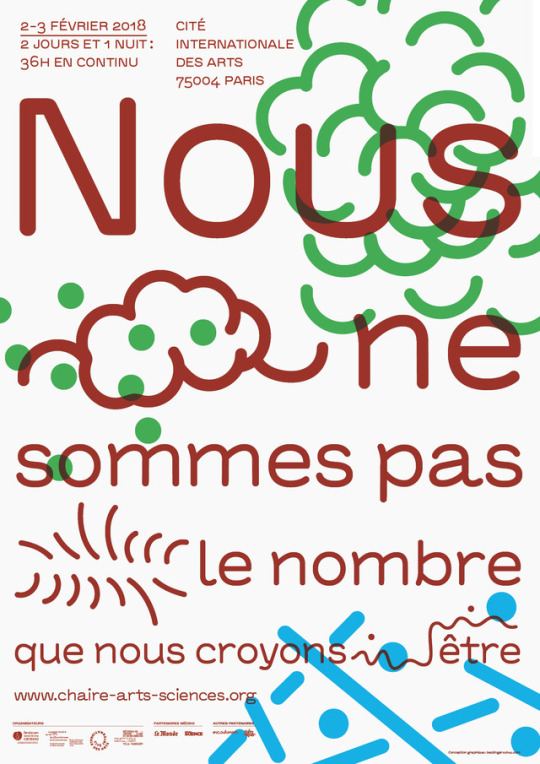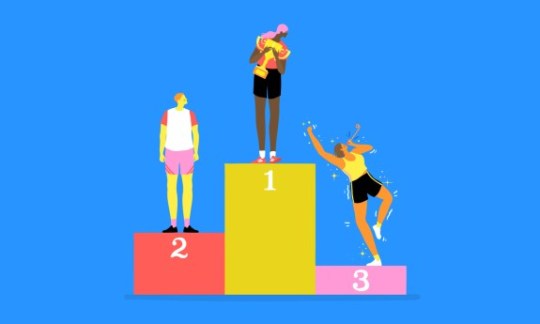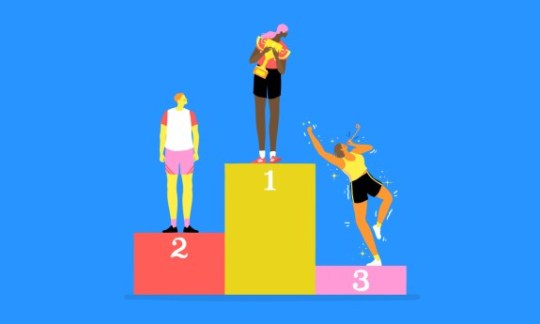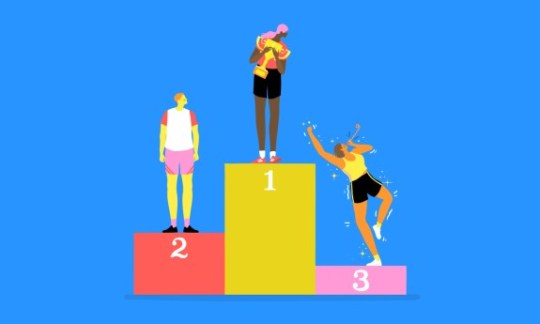#Alice Mollon
Text


Alice Mollon via Illustration Art
1 note
·
View note
Photo

Alice Mollon is a French-born illustrator based in London. She creates bright and bold digital illustrations for a wide range of clients.
This clever illustration entitled ‘Paintbrush’ caught my eye - it recently won an award in the 3x3 Professional Show and is available to buy as a print here.
48 notes
·
View notes
Text
Tips, Tools, and Resources to Help You Build Your Direct Sales Business
Whether you want additional money or to test your entrepreneurial skills, joining an independent distributor for a multi-level marketing (MLM) business is a feasible choice.
MLMs, also known as network marketing or direct sales, provide a tried-and-true product, a marketing strategy, mentoring, and training and support.
It's a business-in-a-box that comes with everything you need to get started right now.
MLM success, on the other hand, is neither automatic nor simple.
Many novice network marketers make the mistake of not approaching their new endeavor like a company.
MLM companies do not run themselves since they come pre-packaged with a product or service, a plan, and support.
Here are some useful tools for networking marketing, including typical misconceptions and errors, success suggestions, how to avoid scammers, and more.
Myths and Facts About Network Marketing
Getty Images / Social Networking Images
Many individuals stay away from MLM-related disinformation.
Legitimate MLMs are not unlawful pyramid schemes, and they do not force you to "use" or bother others.

Anyone, no matter where they are in the network, may be successful, and saturation is impossible.
While there are certain problems with network marketing, before dismissing it as a home business opportunity, be sure you aren't being swayed by one of these misconceptions.
The Facts of MLM Success Scientists presenting facts to the general population
Getty Images / Alice Mollon
One major issue with MLM is the amount of hype that surrounds it.
While businesses attempt to moderate their sales representatives' excitement, too frequently the programs are presented in a manner that implies you may earn a lot of money quickly with little work.
The truth of MLM is that large money is hard to come by.
That isn't to suggest it isn't a realistic method to earn money from home, but it isn't automated or simple.
With sound counsel and hard work, you can overcome the obstacles and achieve success.
Signs of an MLM Scam Burning a $50 bill
Getty Images / Steve Bronstein
Like most other businesses involving money, the MLM industry has its share of frauds and schemes.
Some earn money by requiring sales representatives to carry merchandise (a practice the FTC has worked to put the kibosh on).
Others are blatantly unlawful pyramid schemes that are primarily concerned with recruiting rather than goods (pyramid schemes are seen in financial products, as well).
Consider these warning signs of a scam to avoid being pulled into a less-than-legitimate sales offer.
10 MLM Success Strategies
Moving ladders to allow business executives to ascend the pyramid
Getty Images / Andrew Baker
Success in an MLM business begins with selecting the appropriate product and company, followed by handling your business like a business.
It takes effort to locate clients and generate sales, as well as to develop a team of home business owners, just like any other company.
MLM companies have one of the greatest failure rates of any kind of small company.
Consider these 10 MLM success strategies to help you get a leg up in profitability and longevity.
How to Become a Direct Sales Rockstar
A young lady at home takes a rest with her laptop on her desk.
Getty Images / Westend61
The MLM statistics aren't encouraging, yet many individuals accomplish their objectives and have great success in network marketing.
There's no reason you can't be successful if you put in the effort.
Here are 12 things you can do to guarantee your success and accomplish your network marketing home business objectives.
6 Network Marketing Mistakes Newbies Make Businesswoman doll drowning in sand in hourglass
Getty Images / Oliver Burston
While success is inevitable, failure isn't until you don't put in the effort.
MLM's low success record isn't always the fault of the industry.
Most individuals who fail in network marketing make one of a few mistakes that lead to failure.
To improve your chances of success, avoid making any of these six errors.
6 Methods for Getting the Best MLM Leads
On a black backdrop, a gold king chess piece stands in front of a pawn.
Getty Images / Towfiqu Photography
Finding new clients and prospective company builders is the first, and sometimes most challenging, step.
Your capacity to identify prospects will be critical to your MLM business's success.
Here are six strategies for generating customer and business development leads for your MLM company.
40+ MLM Business Directory
Krisanapong detraphiphat / Getty Images Business objectives idea,Financial goals concept
Direct sales businesses abound, with hundreds, if not thousands, to select from.
It's usually better to go with a business that offers a product or service you're interested in and has a marketing strategy you can put into action.
However, if you'd like to view a list of 40+ possible businesses to join, go here.
If you're looking for a business that isn't on this list, or if you want a longer list, check the Direct Selling Association membership.
Any firm you want to deal with should be a DSA member since the organization evaluates businesses and compels them to adhere to ethical standards.
Contact Us for MLM Software In India
Our Network : MLM Software Company in Kolkata | MLM Software Company in Bangalore | MLM Software Company in Kanpur | MLM Software Company in Indore | MLM Software Company in Thane | MLM Software Company in Visakhapatnam | MLM Software Company in Ghaziabad | MLM Software Company in Ludhiana | MLM Software Company in Agra | MLM Software Company in Nashik
www dot mlmsoftwarez dot in
Helplines : +91-92140-60999
Whatsapp : +91-92140-60999
This content originally appeared on Linkedin Pulse - the place to gain and share knowledge, empowering people to learn from others and better understand the world.
0 notes
Photo



(CHECK THE WEBSITE : lancement chaire arts et sciences)
Chèr.e.s ami.e.s,
Venez débattre vendredi !Je vous invite à un “forum des controverses” sur les enjeux éthiques des maladies neuro-dégénératives (les ‘forums des controverses’ sont des débat-fictions participatif) avec le projet Éphéméride.
• 19h-21h ce vendredi
• 17h-19h pour voir les conférences qui précèdent.
• Cité Internationale des arts: 18 rue de l’hôtel de ville - 75004
• Débat dans l'Atelier 8220, noté numéro 9 sur le plan ci-joint
“NOUS NE SOMMES PAS LE NOMBRE QUE NOUS CROYONS ÊTRE” est le nom de l’événement art-science dans lequel s'inscrit un atelier thématique de 36h sur les savoirs médicaux, auquel je participe en organisant ce débat.
Le fil conducteur de ce foisonnant programme est l’univers d’un recueil de nouvelles de l’auteure américaine de science-fiction Ursula K. Le Guin, The Compass Rose (1982). J'interviendrai au sein de l’atelier qui reprend le titre d’une de ces nouvelles « L’eau est vaste ». Celle-ci attire notre attention sur les rapports que nous entretenons avec les savoirs scientifiques et médicaux qui ne nous encouragent pas toujours à oser explorer d’autres formes de relations de nos corps et de nos êtres à la multiplicité des mondes, visibles et invisibles, qui pourtant nous constituent.L'atelier est porté par Valérie Pihet du collectif Dingdingdong – Institut de coproduction de savoir sur la maladie de Huntington, co-fondé par 17 chercheurs, artistes et professionnels. Dans cet atelier, il s’agira de s’intéresser au « soin des possibles », pour suivre la philosophe Isabelle Stengers quand elle nous invite à penser les possibles contre les probables. Étant toutes et tous concerné.e.s dans une vie par la maladie, que l’on soit soi-même malade, proche d’un.e malade ou professionnel soignant, nous tâcherons d’explorer les manières de prendre soin des différentes formes de savoirs constituées à partir de nos expériences, et non en dehors d’elles. Pour ce faire, nous proposerons des espaces de partage de pratiques d’artistes et de chercheurs qui mettent leurs savoir-faire à l’épreuve de ces expériences, avec les personnes concernées. Nous explorerons également, par des expériences sensorielles – parfois virtuelles -, chorégraphiques et narratives, la question du soin à prendre des sens et des histoires qui nous fabriquent. Ces expériences inviteront les publics à s’éprouver comme faisceaux de relations, espace d’accueil, d’étreintes et de partage.
Programme spécifique de cet atelier :
De 15h à 18h le vendredi 2 février, rencontre avec des chercheurs, artistes et professionnels qui mettent leurs compétences et leurs savoir-faire à l’épreuve d’expériences partagées par des personnes concernées.
De 18h à 19h puis de 21h à 22h le vendredi 2 février, et enfin de 10h à 16h le samedi 3 février, retrouvez-nous pour explorer les possibilités narratives de la réalité virtuelle. Au programme, dans l’ordre, introduction/discussion, démonstrations et atelier de création proposés et animés par Fabien Siouffi (Dingdingdong, Fabbula), Ferdinand Dervieux (Parallèles Editions/Sharpsense) et Sarah Garcin (designer graphique et designer d’interaction). Plus d’info dans le document joint. ATTENTION : pour participer à l’atelier de création, je vous invite à vous inscrire, nombre de places limité : [email protected]
De 19h à 21h le vendredi 2 février, participez au débat conduit par Max Mollon, designer, enseignant et chercheur dédié au design fiction depuis 2010 (Design Fiction Club, Politique-Fiction, What if ? - bureau d’études du débat public). Il portera sur le temps de la maladie tant du point de vue des patients que des aidants. Cette concertation débutera par la présentation d’images fortes – conçues pour l’occasion, afin de stimuler le débat – qui mettent en perspective des scènes de vie de patients, et du même geste, des questionnements éthiques propres à ces sujets complexes.
De 22h à 10h la nuit du 2 au 3 février, venez nous rejoindre pour vivre une expérience sensorielle qui vous invitera à percevoir et ressentir les corps et les lieux comme des espaces de tâtonnement, d’étrangeté et de partage! Cette expérience est proposée par la chorégraphe Anne Collod (Cie … & alters, Dingdingdong).
De 18h à 19h30 le samedi 3 février, assistez à l’atelier « Tâla Médical » proposé par Luc Perera (chercheur en design sonore médical/programme doctoral SACRe), en présence de deux musiciens. Comment le design sonore médical et la musique classique de l’Inde du sud peuvent faire alliance pour tenter d’explorer une préoccupation politique et sociale majeure qui est le vieillissement de la population ? Quelle pratique pour quelle forme de soin ?
En permanence : exposition Dingdingdong – Institut de co-production de savoir sur la maladie de Huntington comprenant vidéos (deux capsules vidéo du docteur Marboeuf à propos de l’unité spéciale Alice Rivières et une vidéo intitulée Journal du futur d’Alice Rivières produites par le département «Narration spéculative» de L’Institut Dingdindong) et documents (posters et centre de ressources)
Je vous encourage vivement à regarder le programme de tout l'évènement. À consulter en ligne, ici.
Cet événement est proposé par la Fondation Daniel et Nina Carasso, en partenariat avec la Chaire “arts & sciences” (portée par l’École polytechnique / l’École nationale supérieure des Arts Décoratifs – PSL / la Fondation Daniel et Nina Carasso) et la Cité internationale des arts. Il rassemblera des centaines d’artistes, chercheurs et groupes de travail d’horizons géographiques et disciplinaires très variés autour d’une expérience inédite, en continu pendant 36h. Ils vous invitent à réfléchir sur le présent et à esquisser ensemble des voies d’avenir.Le programme est très riche et réuni Toutes les infos ici : http://chaire-arts-sciences.org/nous/
Avec la participation de (Warning, name dropping!) :
Bruno Latour,
Pierre-Damien Huyghe,
Christophe Leclercq ,
Giovanna Di Chiro,
Laurent Jeanpierre,
Kristin Ross,
Emmanuel Mahé,
Samuel Bianchini,
Lucile Haute,
Max Mollon,
Ferdinand Dervieux,
Sarah Garcin,
Benoit Verjat,
Nicolas Couturier,
G.U.I.,
Julie Blanc,
David Bihanic,
Anthony Masure ,
Robin de Mourat ,
Vincent Piccolo ,
Annick Rivoire,
Nolwenn Tréhondart,
Valérie Pihet,
Julia Morandeira,
Arrizabalaga,
Thierry Mouillé,
David Zerbib,
Naïm Aît-Sidhoum,
Armand Béhar,
Stéphane Bérard,
Grégoire Bergeret,
Filippo Broggini,
Marie-Haude Caraès,
Nicole MarchandZanartu,
Matthieu Clainchard,
Alexandre Costanzo,
Anna Dezeuze,
Elie During,
Bastien Gallet,
Gianni Gastaldi,
Laurent Jeanpierre,
Charlie Jeffery,
Farah Khelil,
Julia Kremer,
Mauro Lanza,
Frédérique Loutz,
Sophie Mendelsohn,
David Rabouin,
Gaëtan Robillard,
Didier Tallagrand,
Christian Ruby,
Linda Sanchez,
Nicolas Tixier,
Ewen Chardronnet,
Aliens in Green ,
(groupe d’artistes composé,
de Bureau d’études,
Ewen Chardronnet,
Mary Maggic,
Julien Paris,
Spela Petric),
Xavier Bailly,
Julien Bellanger,
Benjamin Cadon,
Nathalie Blanc,
Lauranne Germond,
Annick Bureaud,
Isabelle Carlier,
Erik Noulette,
Chloé Desmoineaux,
Nicolas Floc’h,
Amanda Crabtree,
Valérie Gentilhomme,
Fabrice Lizon,
Jeff Guess,
Léa Le Bricomte,
Robertina Sebjanic,
Annie Sprinkle,
Beth Stephens,
Carole Thibaud,
Miha Tursic,
La Paillasse (Paris),
Garance Malivel,
Jamie Allen,
Merle Ibach,
Jennifer Crouch,,
Nicholas Shapiro,
Christophe Guérin ,
etc.
newsletter
0 notes
Text
Rompimento de adutora deixa Santa Bárbara sem água
Devido a um rompimento na adutora da Avenida Prefeito Isaías Hermínio Romano, durante a madrugada desta segunda-feira (1), o abastecimento de água foi interrompido e pode ocorrer falta d´água
Os bairros afetados são: Palmeiras, Cândido Bertini I e II, Dona Regina, São Camilo, Ferrarezi, Jd. Europa, Europa IV, Chácaras São Sebastião, Santa Rosa, Pq. Planalto, Pq. Nações, Vila Dainese, Jd. Amélia, Pântano, Pântano II, Gerivá, Jd. dos Cedros, Jd. Jacyra, Monte Líbano, Jd. Brasília, Mollon, Mollon IV, Cidade Nova, Cidade Nova II, Pérola, Esmeralda, Nova Conquista, Zabani, Planalto do Sol, Planalto do Sol II, Laranjeiras, Santa Fé e Terras de São Pedro, São Fernando, Antonio Zanaga, Trinta e Um de Março, Conjunto dos Trabalhadores, San Marino, Ângelo Giubina, Terra Azul, São Joaquim, Vila Rica, Barão, Orquídeas, Santa Rosa I, Turmalinas, Adélia I e II, Santa Rita, Inoocop, Pq Industrial Cillo, Pq Industrial Bandeirantes, Santa Inês, Ch. Taver, Paraíso, São Francisco, Pq. do Lago e Vista Alegre.
Em função deste rompimento, a frente de trabalho que estava programada para ocorrer na quarta-feira foi antecipada para hoje e as equipes de manutenção em redes de água vão aproveitar para realizar a troca de carretéis de PEAD (Polietileno de Alta Densidade) e de ferro fundido que serão substituídos na Av. Prefeito Isaías Hermínio Romano e também na Avenida São Paulo.
A previsão para o término dos trabalhos é por volta das 22h, e o abastecimento deve se normalizar perto do meio-dia desta terça (2).
A frente de trabalho programada para amanhã (2) no cruzamento das ruas Cláudio Manuel da Costa, Estrada do Barreirinho e Avenida Antônio Moraes de Barros para realização da execução da obra de interligação de rede de água tratada para o novo Loteamento Aranha de Oliveira permanece agendada. Com isso, os bairros Chácaras Recreio Alvorada, Jardim Santa Alice e Vista Alegre poderão ser afetados. A obra deve se iniciar às 8h00, com previsão de conclusão para às 22h00.
A autarquia solicita a compreensão da população e orienta para que façam a economia no consumo de água das caixas dos imóveis, a fim de minimizar o tempo dessa possível falta d’água. Os telefones para informações são: 0800-770-3459 ou 3459-5910.
O post Rompimento de adutora deixa Santa Bárbara sem água apareceu primeiro em Portal de Americana.
from Cidades – Portal de Americana https://ift.tt/2TNb97a
0 notes
Text
The big benefits of small talk

Alice Mollon
Casual conversations can sometimes lead us to moments of real connection. News director and radio host Kyle Kellams explains how.
Small talk is seen by many of us as the cotton candy of conversation: artificial, unsubstantial and ultimately unsatisfying.
“How many times have you heard, or maybe you’ve said to yourself, ‘I hate small talk’?” asks Kyle Kellams, a Fayetteville, Arkansas, news director and radio host. But he believes that it can serve as the gateway to real understanding.
One “small talk” question that he frequently asks guests in the KUAF studio is: “What’s the first movie you ever saw in a movie theater?” Part of the reason he poses this particular query is technical — he’s testing the sound level of people’s voices on the microphone — but that’s not all. He says, “Sometimes that question leads to an interesting conversation.”
Here’s an example of what he means. One guest’s answer was Jaws, which surprised him because he guessed she must have been quite young at the time. He recalls, “So I asked her — I had to — ‘Who took you as a kid to see Jaws?’ She was kind of sheepish and finally said, ‘My dad.’ Well, that led us to a brief conversation about sharks, about fear, and about, for her, growing up the kid of divorced parents. Then we went away and had the regular conversation about the topic we were scheduled to, and I think it went slightly better because we had actually made a connection.”
Small talk, Kellams emphasizes, isn’t about exchanging idle nothings. It’s a way of forging bonds with people who may appear to have little in common with you. “I think that’s what small conversations can do,” he says. “If you get to know someone just a little bit, it’s harder to yell at them or insult them even if you’re politically polar opposites.”
Small talk can also be a gift that we give each other.
While traveling as a play-by-play announcer for the Arkansas women’s basketball team, Kellams found himself at the bar of a hotel restaurant one evening. He says, “This woman comes up and sits down. She sits down heavy, like [she feels] the weight of the world … She looks over at me and says, ‘How you doing?’ What do you say 99 percent of time when you’re asked that? ‘Good.’ Then you say, ‘How you doing?’ and 99 percent of the time the response is that she’s doing fine too. But she said, ‘Not so good.’”
At the moment, Kellams had a choice. He could politely tell her he had something he had to attend to and retreat to his hotel room, or he could engage. He says, “Filled with nothing to do — I’ve seen every Law and Order — I said, ‘Well, what’s the problem?’ She ends up telling me she was there for her mom’s funeral. Her mom and her had been estranged for decades, if not their entire life. The siblings were [also] estranged from the mother … but she was the oldest so she had the chore of coming to take care of the funeral and any probate. She wasn’t happy about it. For about the next 15 or so minutes, she talked about the childhood she never had, the family she would see on television that she didn’t have and she just missed that. It made her angry and made her melancholy, it made her sad, but that’s … the hand that had been given to her.”
When her take-out order was ready and it was time for her to leave, Kellams offered his sincere hopes that things would get better. He recalls, “She said, ‘Well they’re not going to, but the last 20 minutes have meant the world to me,’ and it really made me feel good if it had made her feel good.”
By “small talk,” Kellams adds, “I’m not talking about, ‘Hey, isn’t that strange weather?’ followed by a few moments of awkward silence and scuffling of feet.” You should probably also refrain from asking “What do you do?” since that question tends to keep things at a superficial level. Instead, you can borrow Kellams’ movie-theater question, or come up with your own. Maybe it’s “What’s the first book you remember reading by yourself?” or “What’s your favorite vegetable?” Think about what could elicit vivid memories or fervent opinions or what you’d be genuinely interested in finding out.
But remember, you’re not there to simply collect their answer and depart. You’re there to receive it like the gift that it is, and respond wholeheartedly. As radio host Celeste Headlee likes to say, “A good conversation is like a game of catch.” Just as you wouldn’t interrupt catching and throwing a ball or Frisbee with a friend to check your phone or look for someone more interesting, commit yourself to following the small talk wherever it may lead.
Watch his TEDxFayetteville talk here:
youtube
ABOUT THE AUTHOR
Mary Halton is Assistant Ideas Editor at TED, and a science journalist based in the Pacific Northwest.
This post was originally published on TED Ideas. It’s part of the “How to Be a Better Human” series, each of which contains a piece of helpful advice from someone in the TED community; browse through all the posts here.
The big benefits of small talk published first on https://premiumedusite.tumblr.com/rss
0 notes
Text
The surprising power in not winning

Alice Mollon
When we come thisclose to triumph, we gain potent energy that we can use to fuel later success, says business school professor Monica Wadhwa.
When we daydream about being at the Olympics or the Academy Awards, we usually picture ourselves as the winners — standing there tearfully while we’re given a gold medal or golden statuette — and not as one of the stoic, stunned also-rans.
But maybe we should imagine ourselves as a runner-up. That’s because, according to Monica Wadhwa, marketing professor at Temple University’s Fox School of Business in Philadelphia, “not winning is, in fact, more powerful than winning,”
She has spent nearly a decade researching this seemingly paradoxical idea, motivated by her childhood experiences. “When I was growing up in India, there was a time when I was addicted to lotteries,” says Wadhwa. What intrigued her were those moments in which she’d buy a ticket, get five out of six winning numbers, and find herself more fired up than ever to play again. She recalls, “I should have been giving up, but it was just the opposite.”
Well, the lottery-loving girl grew up to be a researcher, who was curious to see if this effect extended to others. Through a series of experiments, she has found that people who came close to winning gained greater motivation to succeed in their next efforts than either the winners or the clear losers.
In one experiment, participants played a cellphone game that had a grid of 16 tiles. Half of them covered diamonds; half, rocks. Clicking on a tile revealed a diamond or rock, and if they got eight diamonds without uncovering a rock, they’d win the game and receive a reward. After they played, participants were given a quick survey to evaluate how engaging the game was. They were told to bring their completed surveys to a booth down the corridor and that they’d get a thank-you gift (a chocolate bar) when they did. The researchers secretly recorded the speed of the subjects as they walked down the corridor to return the survey and receive the chocolate.
The near-winners — the people who got seven diamonds, just short of the needed eight — walked significantly faster than the winners and the clear losers. Wadhwa’s hypothesis for why this happened: “You have these non-winners [playing the game and] inching toward the reward. Their motivation is getting intensified, but then they miss it … So what happens to this motivation? It hooks on, gives you the energy for the next goal that you have.”
What about the winners? Wadhwa says, “The winners inch toward their goal, they achieve it, and their motivation is satisfied.” Which leaves them with no need for them to strive for anything else.
But Wadhwa warns, “You’ve got to use the fire in your belly wisely.” As she puts it, “You could use this motivation energy and apply it to that next big project you’re working on — or you could squander this away on another kind of reward, like a night out at a club.”
The results of another experiment by Wadhwa bear this out. She and researchers stationed themselves at a fashion-accessory store, where they gave shoppers scratch-off lottery tickets. If they scratched off six adjacent 8s, they’d get a $20 gift certificate. They were told to shop after they played; as they exited the store, they’d show their store receipt to the researchers and receive a small gift. The scratch cards were rigged so that participants ended up in one of three groups: losers (who got only three 8s), near-winners (five 8s) and winners (six 8s).
Their findings: The near-winners ended up shopping more — and spending more money — than the winners and losers. Wadhwa says, “Their activated energy moved on and hooked on to the shopping goal.
So how can we harness this unique energy in our own lives? Wadhwa says, “When you’re setting goals for yourself, set goals that are slightly beyond your reach.”
Wadhwa, who’s worked with companies to employ these insights, urges managers to try this with their employees. Set targets just outside their grasp but “not so hard that they get demoralized and quit.” She cautions, “You need to understand the capacity of your team members” to figure out the appropriate objective.
Wadhwa has another suggestion for managers: Stop focusing so much on star performers. Instead, tap into the “motivational juice” of non-star performers. For example, with a sales team, she says, “Compare the [non-star] salesperson with the next best performer, so they know they were so close to them … This thought can get their motivation flying.”
Parents can even use this with their children, according to Wadhwa. When kids lose — whether in sports or in school — point out to them how close they came to winning.
If we can learn to tap into this energy, we’ll find, as Wadhaw puts it, that “winners really do not take it all.”
Watch her TEDxINSEAD talk here:
youtube
ABOUT THE AUTHOR
Daniella Balarezo is a Media Fellow at TEDx. She is also a writer and comedian based in NYC.
This post was originally published on TED Ideas. It’s part of the “How to Be a Better Human” series, each of which contains a piece of helpful advice from someone in the TED community; browse through all the posts here.
The surprising power in not winning published first on https://premiumedusite.tumblr.com/rss
0 notes
Text
The surprising power in not winning

Alice Mollon
When we come thisclose to triumph, we gain potent energy that we can use to fuel later success, says business school professor Monica Wadhwa.
When we daydream about being at the Olympics or the Academy Awards, we usually picture ourselves as the winners — standing there tearfully while we’re given a gold medal or golden statuette — and not as one of the stoic, stunned also-rans.
But maybe we should imagine ourselves as a runner-up. That’s because, according to Monica Wadhwa, marketing professor at Temple University’s Fox School of Business in Philadelphia, “not winning is, in fact, more powerful than winning,”
She has spent nearly a decade researching this seemingly paradoxical idea, motivated by her childhood experiences. “When I was growing up in India, there was a time when I was addicted to lotteries,” says Wadhwa. What intrigued her were those moments in which she’d buy a ticket, get five out of six winning numbers, and find herself more fired up than ever to play again. She recalls, “I should have been giving up, but it was just the opposite.”
Well, the lottery-loving girl grew up to be a researcher, who was curious to see if this effect extended to others. Through a series of experiments, she has found that people who came close to winning gained greater motivation to succeed in their next efforts than either the winners or the clear losers.
In one experiment, participants played a cellphone game that had a grid of 16 tiles. Half of them covered diamonds; half, rocks. Clicking on a tile revealed a diamond or rock, and if they got eight diamonds without uncovering a rock, they’d win the game and receive a reward. After they played, participants were given a quick survey to evaluate how engaging the game was. They were told to bring their completed surveys to a booth down the corridor and that they’d get a thank-you gift (a chocolate bar) when they did. The researchers secretly recorded the speed of the subjects as they walked down the corridor to return the survey and receive the chocolate.
The near-winners — the people who got seven diamonds, just short of the needed eight — walked significantly faster than the winners and the clear losers. Wadhwa’s hypothesis for why this happened: “You have these non-winners [playing the game and] inching toward the reward. Their motivation is getting intensified, but then they miss it … So what happens to this motivation? It hooks on, gives you the energy for the next goal that you have.”
What about the winners? Wadhwa says, “The winners inch toward their goal, they achieve it, and their motivation is satisfied.” Which leaves them with no need for them to strive for anything else.
But Wadhwa warns, “You’ve got to use the fire in your belly wisely.” As she puts it, “You could use this motivation energy and apply it to that next big project you’re working on — or you could squander this away on another kind of reward, like a night out at a club.”
The results of another experiment by Wadhwa bear this out. She and researchers stationed themselves at a fashion-accessory store, where they gave shoppers scratch-off lottery tickets. If they scratched off six adjacent 8s, they’d get a $20 gift certificate. They were told to shop after they played; as they exited the store, they’d show their store receipt to the researchers and receive a small gift. The scratch cards were rigged so that participants ended up in one of three groups: losers (who got only three 8s), near-winners (five 8s) and winners (six 8s).
Their findings: The near-winners ended up shopping more — and spending more money — than the winners and losers. Wadhwa says, “Their activated energy moved on and hooked on to the shopping goal.
So how can we harness this unique energy in our own lives? Wadhwa says, “When you’re setting goals for yourself, set goals that are slightly beyond your reach.”
Wadhwa, who’s worked with companies to employ these insights, urges managers to try this with their employees. Set targets just outside their grasp but “not so hard that they get demoralized and quit.” She cautions, “You need to understand the capacity of your team members” to figure out the appropriate objective.
Wadhwa has another suggestion for managers: Stop focusing so much on star performers. Instead, tap into the “motivational juice” of non-star performers. For example, with a sales team, she says, “Compare the [non-star] salesperson with the next best performer, so they know they were so close to them … This thought can get their motivation flying.”
Parents can even use this with their children, according to Wadhwa. When kids lose — whether in sports or in school — point out to them how close they came to winning.
If we can learn to tap into this energy, we’ll find, as Wadhaw puts it, that “winners really do not take it all.”
Watch her TEDxINSEAD talk here:
youtube
ABOUT THE AUTHOR
Daniella Balarezo is a Media Fellow at TEDx. She is also a writer and comedian based in NYC.
This post was originally published on TED Ideas. It’s part of the “How to Be a Better Human” series, each of which contains a piece of helpful advice from someone in the TED community; browse through all the posts here.
The surprising power in not winning published first on https://premiumedusite.tumblr.com/rss
0 notes
Text
The surprising power in not winning

Alice Mollon
When we come thisclose to triumph, we gain potent energy that we can use to fuel later success, says business school professor Monica Wadhwa.
When we daydream about being at the Olympics or the Academy Awards, we usually picture ourselves as the winners — standing there tearfully while we’re given a gold medal or golden statuette — and not as one of the stoic, stunned also-rans.
But maybe we should imagine ourselves as a runner-up. That’s because, according to Monica Wadhwa, marketing professor at Temple University’s Fox School of Business in Philadelphia, “not winning is, in fact, more powerful than winning,”
She has spent nearly a decade researching this seemingly paradoxical idea, motivated by her childhood experiences. “When I was growing up in India, there was a time when I was addicted to lotteries,” says Wadhwa. What intrigued her were those moments in which she’d buy a ticket, get five out of six winning numbers, and find herself more fired up than ever to play again. She recalls, “I should have been giving up, but it was just the opposite.”
Well, the lottery-loving girl grew up to be a researcher, who was curious to see if this effect extended to others. Through a series of experiments, she has found that people who came close to winning gained greater motivation to succeed in their next efforts than either the winners or the clear losers.
In one experiment, participants played a cellphone game that had a grid of 16 tiles. Half of them covered diamonds; half, rocks. Clicking on a tile revealed a diamond or rock, and if they got eight diamonds without uncovering a rock, they’d win the game and receive a reward. After they played, participants were given a quick survey to evaluate how engaging the game was. They were told to bring their completed surveys to a booth down the corridor and that they’d get a thank-you gift (a chocolate bar) when they did. The researchers secretly recorded the speed of the subjects as they walked down the corridor to return the survey and receive the chocolate.
The near-winners — the people who got seven diamonds, just short of the needed eight — walked significantly faster than the winners and the clear losers. Wadhwa’s hypothesis for why this happened: “You have these non-winners [playing the game and] inching toward the reward. Their motivation is getting intensified, but then they miss it … So what happens to this motivation? It hooks on, gives you the energy for the next goal that you have.”
What about the winners? Wadhwa says, “The winners inch toward their goal, they achieve it, and their motivation is satisfied.” Which leaves them with no need for them to strive for anything else.
But Wadhwa warns, “You’ve got to use the fire in your belly wisely.” As she puts it, “You could use this motivation energy and apply it to that next big project you’re working on — or you could squander this away on another kind of reward, like a night out at a club.”
The results of another experiment by Wadhwa bear this out. She and researchers stationed themselves at a fashion-accessory store, where they gave shoppers scratch-off lottery tickets. If they scratched off six adjacent 8s, they’d get a $20 gift certificate. They were told to shop after they played; as they exited the store, they’d show their store receipt to the researchers and receive a small gift. The scratch cards were rigged so that participants ended up in one of three groups: losers (who got only three 8s), near-winners (five 8s) and winners (six 8s).
Their findings: The near-winners ended up shopping more — and spending more money — than the winners and losers. Wadhwa says, “Their activated energy moved on and hooked on to the shopping goal.
So how can we harness this unique energy in our own lives? Wadhwa says, “When you’re setting goals for yourself, set goals that are slightly beyond your reach.”
Wadhwa, who’s worked with companies to employ these insights, urges managers to try this with their employees. Set targets just outside their grasp but “not so hard that they get demoralized and quit.” She cautions, “You need to understand the capacity of your team members” to figure out the appropriate objective.
Wadhwa has another suggestion for managers: Stop focusing so much on star performers. Instead, tap into the “motivational juice” of non-star performers. For example, with a sales team, she says, “Compare the [non-star] salesperson with the next best performer, so they know they were so close to them … This thought can get their motivation flying.”
Parents can even use this with their children, according to Wadhwa. When kids lose — whether in sports or in school — point out to them how close they came to winning.
If we can learn to tap into this energy, we’ll find, as Wadhaw puts it, that “winners really do not take it all.”
Watch her TEDxINSEAD talk here:
youtube
ABOUT THE AUTHOR
Daniella Balarezo is a Media Fellow at TEDx. She is also a writer and comedian based in NYC.
This post was originally published on TED Ideas. It’s part of the “How to Be a Better Human” series, each of which contains a piece of helpful advice from someone in the TED community; browse through all the posts here.
The surprising power in not winning published first on https://premiumedusite.tumblr.com/rss
0 notes